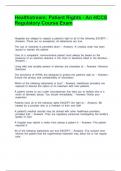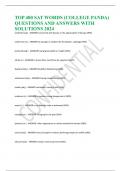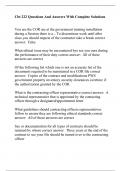COM2604 MASS COMMUNICATION AND MEDIA THEORY
STUDY NOTES
,CHAPTER 2: THE MEDIA IN AFRICA
INTRODUCTION
British historical accounts of the media into six rival narratives
• The liberal narrative
• The feminist narrative
• The populist narrative
• The liberation narrative
• The anthropological narrative
• The radical narrative
In liberal history the winning of media freedom empowered the people. In populist history people
demanded and obtained the media entertainment they wanted. In feminist history the media
responded to the increased liberation of women. In libertarian and anthropological historical
accounts the media came to promote greater social tolerance and to represent the nation in a more
socially inclusive way. The radical narrative tells of the creation of a reason-based public sphere with
a restricted membership, followed by a descent into manipulation and control
THE MEDIA IN AFRICA: COLONIAL PERIOD
The status of contemporary African media is implicated in the colonial past, todays English speaking
press in Africa have roots in four different kinds of early newspapers.
• Official government gazettes
• The missionary press
• Privately owned newspapers
• The underground political, anti-colonial news sheets
Colonialism defined: goes beyond the simple process of recreating colonies, and is considered a
continuing legacy manifested in the way sovereign political communities emerged at the end of the
Second World War. Fieldhouse defined as the state of subjection – political, economic and
intellectual – of a non-european society which was the product of imperialism.
Post colonialism: concept that marks the realities of nations and peoples emerging into a new
imperialist context of economic and sometimes political domination. Post colonialism attacks the
status qou of economic imperialism but also signals an activist engagement with positive political
positions and new forms of political identity.
African nationalism: depicts a specific historical moment of struggle by African peoples to assert a
postcolonial identity based on their cultural and historical experiences. Represents a moveme nt for
self-determination in an increasing number of African countries. After the Second World War the
African nationalism became more pronounced, largely because it was appropriate by many black
Africans as an affirmation of their human rights.
,The beginnings of the media in Africa:
in Anglophone Africa the development of the media was directly or indirectly linked to the colonial
objectives of the British empire. Arabs brought literacy to west and east Africa, technology of
printing came from Europe and the United States. The genesis of African journalism lay in the dry
official publications of colonial governments. The press in Africa began with the publications owned
or operated by officials of the British government. Anglo colonialism focused on capitalism, French
colonialism concerned with culture.
THE FUNCTIONS OF THE MEDIA IN COLONIAL AFRICA
• Colonialist consolidation
o During the period of stabilized colonial rule, the key structure in the socialization
press – schools, religious Organisations, media of communication and governmental
institutions, were concerned in various ways with rationalizing perpetuating and
fostering loyalty or conformity to the colonial regime
o Colonialism used the mass media to inculcate and entrench the belief that
colonialism was a moderninsing practice meant to develop the natives
o The colonial press was part of the campaign to spread and consolidate the ideology
of empire
• African nationalism
o Native resistance sometimes led to the development of media to counter the surge
of colonial consolidation
o African-owned newspapers served as a platform for te nationalist ideas of educated
Africans]nationalist newspapers had been a considerable influence in the awakening
of racial and political consciousness in the first wave of democracy on the African
continent
• Palliative treatment for the natives
o Colonial media may have served as a tool for anaesthetizing the natives with
entertainment and supposedly developmental issues
o In many circumstances radio may have been a palliative to make native Africans
forget the injustices of colonial repression and the pain of racial subjugation
• Colonialist federalism
o not all colonial era white media shared identical viewpoints
• Capitalist expansion in post-war Africa
o 1940’s entry of foreign newspapers
o The policy of these papers was vigorous neutrality among competing parties,
objective reporting of news by African reporters and editors, constructive criticism,
high-volume production and territory-wide distribution
o Such papers were instrumental in establishing a more professional basis for the
press and linking literate Africans with their new nationalist leaders
• Anti-communism
, o 1940’s the desire to take speedy counter-measures against communism provided a
powerful inducement to provide funds from the united kingdom specifically to
develop broadcasting
POST-COLONIAL MEDIA IN AFRICA
The nationalist agenda of the anti-colonial period influenced much of the media in the post-colonial
era. Some nationalist leaders who assumed the reins of political power at independence of colonial
rule had published newspapers e.g Nnamdi Azikwe of Nigeria, such nationalists generally saw the
media in the postcolonial state as a vehicle for propagating their agenda of ethnic unification,
national development and political consolidation. The continued ownership of broadcasting by the
state was common evidence of this ideological viewpoint. The media was sometimes seen as
instruments for forging a pan-African identity in the face of neo-colonialist tendencies by the forme r
colonizers.
POSTCOLONIAL MEDIA: STATE CONTROL
Many post-colonial governments approach towards the media were located in the ideology of
development communication, which stressed the transfer of technology and socio-political culture
of modernity from developed and industrialized to the so called third world. The new nations
aspired for political, economic and cultural self-determination.
Kwame Nkrumah, Ghana, the truly African revolutionary press existed in order to present and carry
forward our revolutionary purpose. To establish a progressive political and economic system upon
our continent that will free man from want and every form of injustice.
This entailed greater state control of the media, a departure from the private ownership of media
evident in colonial period. Some nationalist leader went so far as to articulate “philosophies” to
justify state ownership of the media, Kenneth Kaunda, Zambia’s first president believed that
philosophy of humanism which subjected all major societal intuitions, including the media to the
state.
• Several consequences
o Appointment of senior managerial and editorial executives chosen by the ruling
party
o Highly centralized editorial decisions
o Lack of innovation
o Hierarchical reporting
o Marginalization of oppositional voices from political parties and civil society
o Insufficient funds to create innovative content
o Lack of competitive edge
POST-COLONIAL FUNCTIONS OF THE MEDIA: NATION-BUILDING
• Nation building
o Nationalists needed the press to build the new nations
o Create feeling of nationhood among people divided by tribes
o Explain objectives of a socialist society







